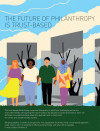
(Illustration by Andrea Mongia)
Through the years, funders would inform these of us on the Hill-Snowdon Basis, “You’re such an instance.” They had been so happy with our organizing work, particularly within the US South. They pointed to how we centered {our relationships} with our companions and the way we targeted on racial justice as underlying and informing each difficulty. These acknowledgments may have served as a sign that we had been doing sufficient, inflicting us to cease interrogating our personal behaviors.
The Way forward for Philanthropy Is Belief-Based mostly
The trust-based philanthropy motion has grown in speedy time, however there are nonetheless fundamental misunderstandings about this method and its daring imaginative and prescient for a extra simply and democratic society. This complement illustrates what a trust-based method actually means, why it’s important to efficient philanthropy, and what will probably be doable if extra funders embrace it. Sponsored by the Belief-Based mostly Philanthropy Mission
However we didn’t cease. As an alternative, we uncovered gaps in our method and outdated practices that didn’t align with our values. Like so many in philanthropy, we relied on previous habits, having inherited sure practices with out taking time to critique them. A brand new philosophy that aligned with trust-based philanthropy helped us notice that our dedication to centering racial justice and energy constructing required us to vary.
Collectively, we provide our mixed reflections on that course of as government director and board president of the Hill-Snowdon Basis. We share the next street map for different funders who’re dedicated to advancing justice however might really feel caught utilizing typical practices that trigger extra hurt than good.
Cease Ambivalent No’s
Our want for change got here into sharp focus in 2020. Funders that had lengthy accepted establishment philanthropy started to shift when confronted with the unprecedented wants of communities amid the pandemic, racial justice uprisings, and political upheaval.
Within the spring of that yr, the Hill-Snowdon workers had many calls with our companions to listen to what the muse may do to higher assist them. On the finish of 1 name, one among our longtime companions, the Black Organizing Mission, inquired if the muse may start multiyear grantmaking.
Till that time, Hill-Snowdon had solely supplied long-term grants on an annual foundation. To us, longer or shorter grant durations had been a technicality; our dedication was the identical. Nonetheless, for our group companions, who had requested us to shift to multiyear grants throughout our 2005 strategic planning course of, longer-term grants introduced stability to their work.
But we had failed to understand this reality—not due to a strategic disagreement however merely, we realized, due to behavior: Multiyear grants would have required modifications to our accounting practices. The shift from one yr to a number of was tedious and technical, which on the time was sufficient of a barrier to cease us altering.
Fifteen years later and within the context of disaster and turmoil, our “ no” to the request for multiyear funding felt improper. It served our personal pursuits, not our group companions’.
Reorienting to Service
Our shift from single-year grants to multiyear funding opened different questions and potentialities. We referred to as this our strategic reorientation: We reoriented ourselves from supporting our companions to serving them, by not solely transferring the muse’s grant {dollars} to our group companions but in addition doing it in a manner that absolutely and intentionally aligned with our values.
This service reorientation gave us a distinct lens for inspecting our work. We started to ask ourselves, “How is that this serving our companions?” When the reply was that it wasn’t, we then requested what should change in order that it did. For instance, workers members beforehand spent tons of of hours creating lengthy and detailed write-ups for our board dockets. After we realized that this wasn’t serving our companions, we eradicated these time-consuming write-ups, which created time for workers to attach with group companions to study extra about easy methods to higher serve them.
The Situations for Change
Amongst many components that helped the Hill-Snowdon Basis introduce these modifications was the readability of our values round energy and racial justice. Constructing trusting relationships with our companions had at all times mattered to us and was central to Nat Chioke Williams’ expertise as a group and youth organizer. We had been dedicated to investing immediately in and following the lead of marginalized people working to create a brand new system that benefited everybody.
Hill-Snowdon’s racial justice orientation made it doable to discover the modifications we integrated into our group. Belief-based philanthropy gave us the language to know that whereas we had been clear on our values, our dedication to relationships was not being mirrored in our grantmaking practices. With modifications like embracing multiyear grants and getting rid of prolonged dockets, we noticed our group’s actions extra carefully mirror our phrases. As we moved into our strategic reorientation, we discovered 4 classes, which we hope will encourage different basis board and workers members looking for to strengthen their very own racial justice and trust-based orientations:
Think about the modifications your board wants. | One in all Williams’ major roles is to foster relationships between the board and the group. That is accomplished by way of website visits and different alternatives that floor racial justice points in private expertise and connection. By making this an specific a part of his function, Williams constructed belief, ultimately paving the way in which to increasing the board to incorporate trustees past simply members of the family.
In 2020, three non-family group trustees—leaders of colour who’re consultants of their fields—joined the board. Recruiting, choosing, and onboarding new trustees took a substantial amount of care and contemplation. We pushed ourselves to know easy methods to create a multiracial house from a monoracial one. We additionally redefined our board’s function so as to enhance assist for Black-led organizing.
Moreover, in November 2022, the Hill-Snowdon board determined to relinquish a few of its decision-making energy. In that assembly, we voted to maneuver to multiyear basic working assist grants and to switch decision-making for all grants as much as $100,000 to our workers.
Deepen inside racial justice work. | Hill-Snowdon was not new to racial justice and fairness grantmaking. However we realized that changing into absolutely dedicated to anti-racism as a company required exploring what it means to have a predominantly white board investing in Black-led organizing. It was not sufficient to depend on aligned grantmaking or to ask the board to construct alliances with our group companions. We additionally examined our identities in relation to the work, together with the biases we carry.
Whereas we already had the will to have interaction on this work, we didn’t have the construction and assist for reflection and studying. Hill-Snowdon employed a racial fairness guide to embark on this journey with members of the family on the board, yr over yr. The method included having deep conversations in regards to the household’s intersections with racism and inspecting their sources of wealth.
Spend money on constructing belief internally. | We try for nonhierarchical dynamics and relationships. For instance, any workers member might attend any board committee assembly. We additionally respect the experience, expertise, and information of every individual on the workforce. Liz Bonner, a household trustee, has full religion in Williams because the knowledgeable in grantmaking and the one that has deep relationships with grassroots companions and different funders. It could sound simplistic, however sharing every individual’s contributions and dealing collectively for thus a few years have cultivated mutual belief and respect.
In 2014, when Michael Brown was killed by police in Ferguson, Missouri, and BLM was gaining mainstream visibility, Williams wrote an article referred to as “Making Black Lives Matter,” about philanthropy’s function in investing in Black-led social change. As government director, Williams knowledgeable the board that the article can be printed beneath the Hill-Snowdon Basis’s identify, quite than asking for his or her permission. The whole board endorsed his choice as a result of they absolutely supported his management—a degree of affirmation reflecting their relationship rooted in belief, shared values, and a shared dedication.
Begin with energy. | If our purpose is to redistribute energy towards a extra equitable future, we should start by figuring out how and the place energy exists in our work and processes. From there, funders can start making intentional shifts towards a higher purpose.
When Hill-Snowdon started updating our method, we bought organized by making a map of the modifications beneath our new mannequin. With each interrogation of a course of got here change. All the weather in our work had been linked, requiring us to remain deliberate and versatile. For instance, once we eliminated our board dockets, we needed to rethink board conferences and workers roles in order that we may proceed to share high-level learnings with the board. We found that 100 components needed to change.
Vigilance Is the Solely Victory
How, on this second, can there be racial-justice funders who don’t adhere to trust-based ideas? How are we nonetheless witnessing funders who voice their dedication to social justice whereas lacking the prospect to actually serve their companions?
After we perceive that this work is about breaking down hierarchies and restructuring relationships, we notice, as Williams says, that vigilance is the one victory. Who we’re and the way we present up is a perpetual expertise. There isn’t a end line. You can not have a simply society with out trusting within the humanity of all folks.
In recent times, now we have seen some funders change the window dressing of their grantmaking to resemble trust-based practices. However trust-based philanthropy is deeper than a shift to multiyear grantmaking or simplifying grant functions. If we cease being vigilant about making racial justice and belief the muse of our work, we threat replicating the very dynamics that outline our unequal society. Vigilance is particularly essential if we perceive philanthropy as a direct product of racialized energy on this nation. If we are able to change relationships in our sector, think about the potential for change on a good broader scale.
Assist SSIR’s protection of cross-sector options to international challenges.
Assist us additional the attain of revolutionary concepts. Donate as we speak.
Learn extra tales by Nat Chioke Williams & Liz Bonner.

